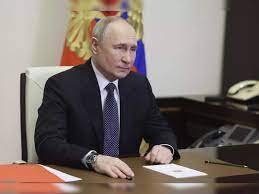Putin Secures Another Six-Year Term in Russian Election
In a significant political development, Vladimir Putin has clinched another six-year term in the Russian presidential election, solidifying his grip on power for the foreseeable future. This victory marks his fourth term as President of Russia, extending his tenure well into the next decade. The election results, although anticipated by many, bear profound implications for Russia’s domestic affairs and its role on the global stage.
Historical Context
In understanding the significance of Putin’s reelection, it’s crucial to delve into the historical backdrop of Russian politics. Since assuming office in 1999, Putin has been a dominant figure in Russian politics, wielding considerable influence both domestically and internationally. Over the years, his leadership has been marked by a mix of authoritarian tendencies and strategic pragmatism, shaping Russia’s trajectory in the post-Soviet era.

Why this News is Important
The reelection of Vladimir Putin holds paramount importance on various fronts.
- Consolidation of Power: Putin’s victory cements his position as the preeminent political figure in Russia, consolidating power in his hands for another term. This continuity ensures stability in governance but also raises concerns about the concentration of power within a single individual.
- Domestic Implications: Domestically, Putin’s reelection is expected to maintain the status quo in Russian politics, characterized by centralized authority and limited political dissent. It underscores the enduring popularity of Putin among a significant segment of the Russian population, despite economic challenges and allegations of electoral irregularities.
- Geopolitical Ramifications: On the global stage, Putin’s continued leadership has far-reaching implications. Russia under Putin has pursued assertive foreign policies, often challenging Western interests and norms. His reelection signals continuity in Russia’s foreign policy objectives, with potential ramifications for international relations, particularly in regions of strategic importance such as Eastern Europe and the Middle East.
- Economic Considerations: Economically, Putin’s victory is likely to shape Russia’s economic policies, including efforts to diversify the economy and navigate geopolitical tensions. The Russian economy, heavily reliant on energy exports, faces challenges ranging from sanctions to fluctuating oil prices. Putin’s leadership will play a pivotal role in addressing these challenges and steering the country’s economic course.
- Implications for Democracy: Putin’s reelection raises broader questions about the state of democracy in Russia. Critics have long accused the Russian government of suppressing political opposition and curtailing civil liberties. The election outcome rekindles debates about the prospects for democratic reform and the balance between stability and democratic principles in Russian governance.
5 Key Takeaways from Putin’s Reelection
| Serial Number | Key Takeaway |
|---|---|
| 1 | Vladimir Putin secures another six-year term as President of Russia, extending his tenure into the next decade. |
| 2 | The reelection underscores Putin’s enduring popularity among a significant portion of the Russian populace, despite allegations of electoral irregularities and economic challenges. |
| 3 | Domestically, the victory ensures continuity in Russian politics, characterized by centralized authority and limited political dissent. |
| 4 | Putin’s continued leadership holds significant geopolitical implications, shaping Russia’s foreign policies and its interactions with other global powers. |
| 5 | The reelection reignites debates about the state of democracy in Russia and the balance between stability and democratic principles in governance. |
Important FAQs for Students from this News
1. What is the significance of Vladimir Putin’s reelection?
A: Putin’s reelection solidifies his grip on power in Russia for another six-year term, shaping domestic and international affairs.
2. How many terms has Vladimir Putin served as President of Russia?
A: Putin has served four terms as President of Russia, with his latest reelection extending his tenure.
3. What are the implications of Putin’s victory for Russian politics?
A: Putin’s victory maintains the status quo of centralized authority and limited political dissent in Russian politics.
4. How might Putin’s reelection affect Russia’s foreign policy?
A: Putin’s continued leadership is likely to influence Russia’s foreign policies, potentially impacting geopolitics in regions like Eastern Europe and the Middle East.
5. What are the concerns raised by critics regarding Putin’s reelection?
A: Critics have raised concerns about democratic principles, alleging electoral irregularities and suppression of political opposition.
Some Important Current Affairs Links


















 Exciting News!
Exciting News!  Join Our Telegram Channel Now!
Join Our Telegram Channel Now!
 Join our Telegram channel for a thrilling adventure into the world of daily current affairs.
Join our Telegram channel for a thrilling adventure into the world of daily current affairs. 
 Don’t miss out on the latest updates and insights! Click to join now and be part of the knowledge revolution!
Don’t miss out on the latest updates and insights! Click to join now and be part of the knowledge revolution! 
